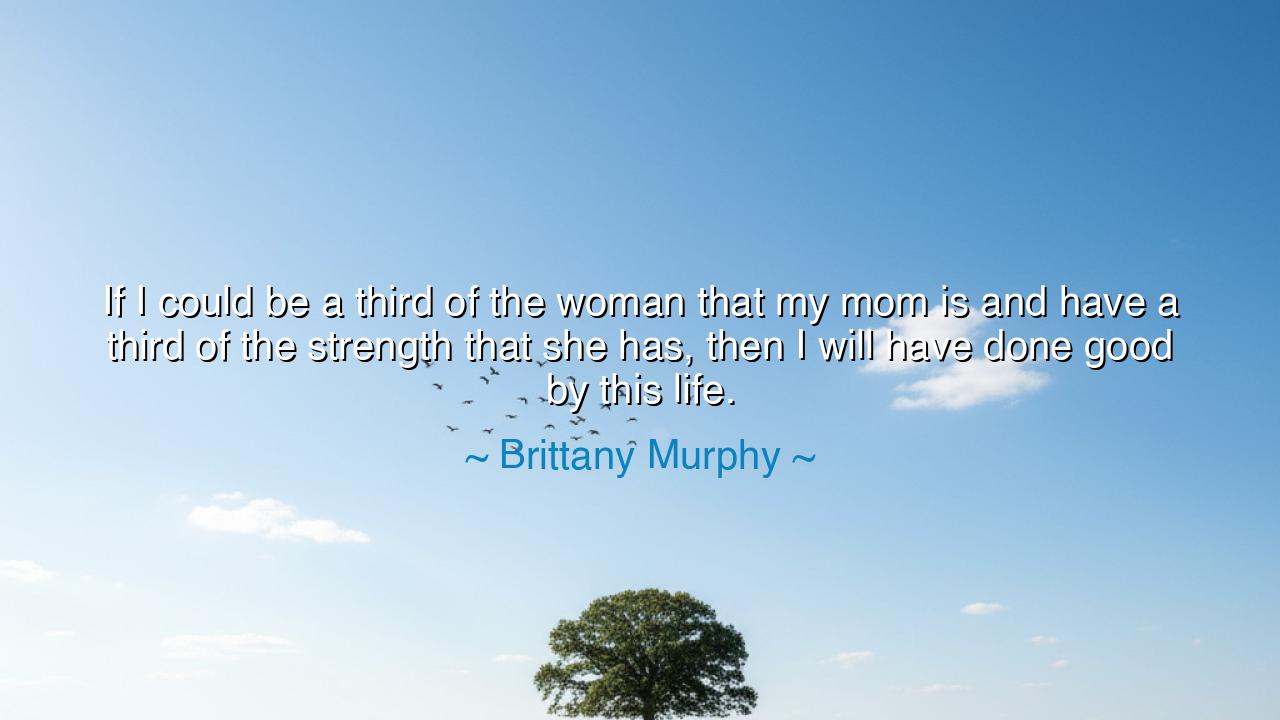
If I could be a third of the woman that my mom is and have a
If I could be a third of the woman that my mom is and have a third of the strength that she has, then I will have done good by this life.






When Brittany Murphy said, “If I could be a third of the woman that my mom is and have a third of the strength that she has, then I will have done good by this life,” she was not merely offering praise to her mother — she was revealing a profound truth about humility, gratitude, and the inheritance of strength. Her words rise from the timeless understanding that true greatness is not found in fame or fortune, but in the quiet endurance of those who raised us, loved us, and shaped our souls. Within this simple sentence lies the reverence of a daughter who recognizes that the measure of one’s worth is not self-made, but passed down through the example of those who came before.
In the style of the ancients, such a declaration would be seen as a sacred vow — a recognition that one’s life is part of a lineage, a continuation of virtues tested by time. To say “a third of the woman” is not to diminish oneself, but to exalt the mother whose courage, resilience, and compassion became the foundation upon which her child stands. In Brittany’s tone, there is awe, a sense of reverent wonder, as if she knows that her mother’s strength is something forged in unseen fires — the strength of survival, sacrifice, and unwavering love. It is the kind of strength that does not boast, but sustains; that does not conquer kingdoms, but carries families through storms.
Throughout history, we find echoes of this same reverence. The ancient Greeks honored their mothers as the keepers of civilization, the first teachers of courage and virtue. The Roman matron, though confined to the domestic sphere, was regarded as the moral anchor of the empire. In her silence, she ruled hearts; through her patience, she raised heroes. Consider Cornelia, mother of the Gracchi brothers, who, when asked to show her jewels, pointed to her sons and said, “These are my treasures.” Her legacy was not carved in marble, but in character — the same kind of invisible monument Brittany Murphy speaks of when she speaks of her mother’s strength.
That strength, in Murphy’s reflection, is not the loud, militant kind, but the quiet and enduring one — the strength to rise each day, to work, to forgive, to nurture, to hold steady when the world seems to fall apart. It is the kind of strength mothers across generations carry like sacred fire, lighting the way for their children. Brittany’s words reveal a deep truth that many forget: that the world’s most powerful examples often dwell in ordinary lives. The strength of a mother may not be recorded in history books, but it builds the moral architecture of humanity.
Her humility — the wish to be “a third” as strong — teaches us another kind of wisdom: that greatness begins in admiration and gratitude. In an age that glorifies independence and self-made success, Murphy’s sentiment brings us back to the ancient truth of interdependence — that who we become is shaped by the love, sacrifice, and resilience of others. Her words remind us that it is noble to look upward, to see in someone else a standard higher than our own, and to let that vision pull us toward a better self. To honor one’s mother, in this sense, is not just filial love; it is spiritual humility.
Consider the story of Maya Angelou, who once said of her own mother, “To describe my mother would be to write about a hurricane in its perfect power.” Like Brittany, Angelou understood that a mother’s love and resilience are elemental forces — capable of destruction or creation, but always rooted in fierce protection. Both women, though from different worlds, understood the sacred paradox of motherhood: that softness and strength are not opposites, but twins of the same divine essence. To be strong as a mother is to be both tender and unbreakable, both nurturing and enduring.
And so, from Brittany Murphy’s words, we draw a timeless lesson: to live a life of gratitude and aspiration toward those who gave us life. The measure of success is not how high we climb, but how faithfully we reflect the virtues of those who lifted us up. To those who have mothers — cherish them, learn from them, and let their resilience guide you. To those who are mothers — know that your strength, though unseen, shapes the future more than you will ever know.
For in the end, Murphy’s words remind us that a mother’s greatness is eternal, carried onward through the hearts of her children. The daughter who aspires to inherit even a third of that strength ensures that it will never die — that it will live on, multiplied by love, through every generation that remembers where their light began.






AAdministratorAdministrator
Welcome, honored guests. Please leave a comment, we will respond soon